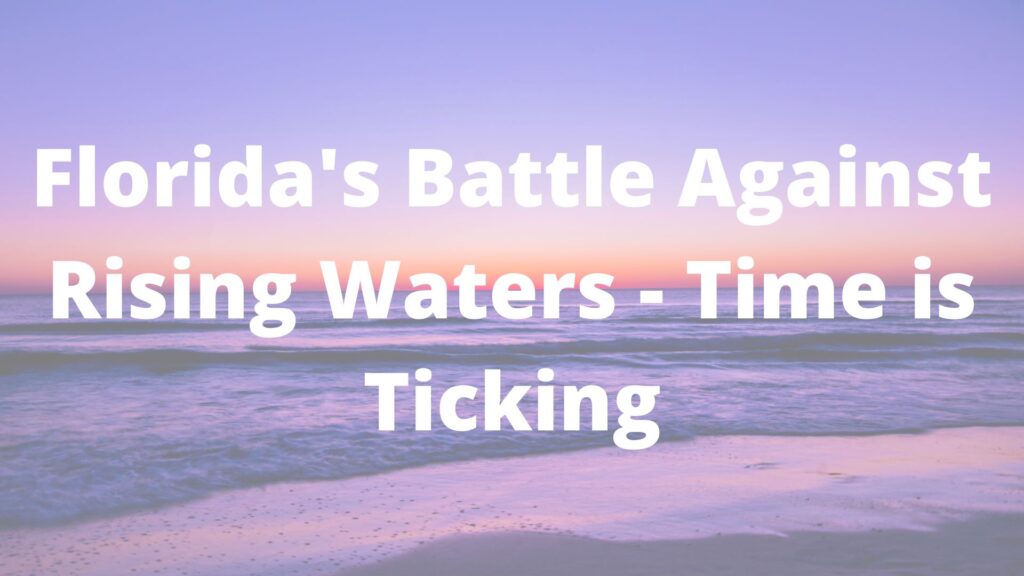
Florida’s coastal cities, renowned for their vibrant architecture and booming construction industries, face an escalating threat from rising sea levels. This phenomenon poses significant challenges to the longevity and safety of coastal infrastructure, demanding innovative solutions and a paradigm shift in construction practices.
The impact of rising sea levels is already evident. Increased “nuisance flooding,” saltwater intrusion into groundwater supplies, and accelerated beach erosion are becoming commonplace. These effects directly threaten the structural integrity of buildings, roads, and other coastal infrastructure. For example, in areas like Miami Beach, where porous limestone bedrock exacerbates the issue, saltwater is not only encroaching from the ocean but also bubbling up from below, leading to more frequent and intense flooding. This case study highlights the vulnerability of Florida’s coastal regions and the urgent need for adaptation.
The architectural and construction industries must adapt to these changing conditions. This necessitates a move towards climate-resilient designs and construction practices. Key strategies include:
- Elevated Foundations: Constructing buildings on elevated foundations to mitigate flood risks.
- Reinforced Materials: Utilizing hurricane-resistant materials, such as impact-resistant windows and reinforced concrete, to withstand extreme weather events.
- Improved Storm Management: Implementing advanced storm management systems to handle increased rainfall and reduce urban flooding.
- Sea level impact projection studies: Florida has implemented laws that require state funded construction projects in coastal areas, to perform sea level impact projection studies. This allows for planning, and building with the future in mind.
These adaptations require a collaborative effort between architects, engineers, and policymakers. Building codes must be updated to reflect the latest scientific understanding of sea-level rise, and investments in resilient infrastructure must be prioritized.
The economic implications are substantial. Increased insurance costs, potential property devaluation, and the need for costly infrastructure upgrades will place significant financial burdens on coastal communities. Furthermore, the disruption of tourism, a major economic driver in Florida, could have far-reaching consequences.
Florida’s extensive coastline and low-lying topography make it exceptionally vulnerable to rising sea levels. Here’s a breakdown of the areas most at risk:
Key Regions and Counties:
- Southeast Florida:
- This region is considered particularly vulnerable. The Southeast Florida Regional Climate Change Compact, which focuses on coordinated climate action, highlights these counties:
- Monroe County (Florida Keys)
- Miami-Dade County
- Broward County
- Palm Beach County
- This region is considered particularly vulnerable. The Southeast Florida Regional Climate Change Compact, which focuses on coordinated climate action, highlights these counties:
- Other Vulnerable Counties:
- Pinellas County (Tampa Bay area)
- Lee County (Fort Myers, Cape Coral)
- Manatee County.
- Cities at High Risk:
- Miami and Miami Beach
- Fort Lauderdale
- Cape Coral
- Tampa
- Jacksonville
- Key West.
- Pembroke Pines.
Factors Contributing to Risk:
- Low-lying topography: Much of Florida’s coastal land is very close to sea level.
- Porous limestone bedrock: This allows saltwater intrusion into groundwater.
- Extensive coastlines: Florida has a vast network of coastlines, making it susceptible to widespread impacts.
- Canal systems: many inland cities are connected to the ocean through canals, that will also raise in water levels.
It’s important to note that the impacts of sea-level rise are not uniform. Some areas may experience more frequent flooding, while others may face increased erosion or saltwater intrusion.
In conclusion, Florida’s rising sea levels present a formidable challenge to its architectural and construction industries. By embracing innovative design solutions, adopting resilient construction practices, and implementing proactive policies, Florida can mitigate the impacts of sea-level rise and ensure the long-term sustainability of its coastal cities.
 John Caravella Esq., is a construction attorney and formerly practicing project architect at The Law Office of John Caravella, P.C., representing architects, engineers, contractors, subcontractors, and owners in all phases of contract preparation, litigation, and arbitration across New York and Florida. He also serves as an arbitrator to the American Arbitration Association Construction Industry Panel. Mr. Caravella can be reached by email: [email protected] or (631) 608-1346.
John Caravella Esq., is a construction attorney and formerly practicing project architect at The Law Office of John Caravella, P.C., representing architects, engineers, contractors, subcontractors, and owners in all phases of contract preparation, litigation, and arbitration across New York and Florida. He also serves as an arbitrator to the American Arbitration Association Construction Industry Panel. Mr. Caravella can be reached by email: [email protected] or (631) 608-1346.
The information provided on this website does not, and is not intended to, constitute legal advice; instead, all information, content, and materials available on this site are for general informational purposes only. Readers of this website should contact their attorney to obtain advice with respect to any particular legal matter. No reader, user, or browser of this site should act or refrain from acting on the basis of information on this site without first seeking legal advice from counsel in the relevant jurisdiction. Only your individual attorney can provide assurances that the information contained herein – and your interpretation of it – is applicable or appropriate to your particular situation. Use of, and access to, this website or any of the links or resources contained within the site do not create an attorney-client relationship between the reader, user, or browser and website authors, contributors, contributing law firms, or committee members and their respective employers.
Resources:
- Sea Level Rise – Florida Climate Center: https://climatecenter.fsu.edu/topics/sea-level-rise
- Climate Change and Sea-Level Rise in Florida: https://floridadep.gov/sites/default/files/Climate%20Change%20and%20Sea-Level%20Rise%20in%20Florida_1.pdf
- Commercial Construction Trends Reshaping Florida’s Landscape in 2025: https://cicconstruction.com/blog/commercial-construction-trends-reshaping-floridas-landscape/
- New Florida law will require sea level studies for coastal construction projects – ICC: https://www.iccsafe.org/building-safety-journal/bsj-hits/new-florida-law-will-require-sea-level-studies-for-coastal-construction-projects/
- Will South Florida sink or swim under rising sea levels? – The Architect’s Newspaper:
- https://www.archpaper.com/2017/04/south-florida-rising-sea-levels/
